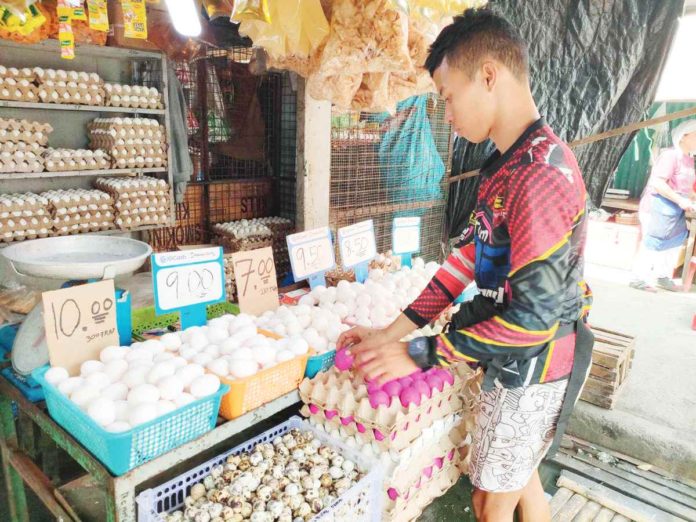
BY IME SORNITO and MA. THERESA LADIAO
ILOILO City – Western Visayas’ egg supply is well-balanced with consumption needs, according to the Department of Agriculture (DA), dismissing concerns of an oversupply.
Although exact figures on egg production in the region are not available, market analysis and discussions with local traders reveal that some are still procuring eggs from Luzon and Cebu to fulfil local demand.
“We are just about right with our supplies, even though we have to bring in additional stocks from Cebu and Luzon. Our own production falls short,” said Maria Teresa Solis, the chief of DA Region 6’s Agribusiness and Marketing Assistance Division.
Iloilo province, with its numerous poultry farms, along with other areas in the region, occasionally cannot meet the local demand, prompting some traders to source eggs from elsewhere in the country.
DA-6’s price monitoring has indicated a minor decrease in egg prices by P0.50.
The price for medium-sized eggs has declined from P9.50 in December to P9 in January and February 2024.
This price drop is linked to reduced demand during the less festive months of January and February, in contrast to December, which is marked by Christmas and New Year celebrations and higher egg consumption for baking purposes.
The first week of February saw slight variations in the retail prices of medium-sized eggs across the region:
* Aklan – P9
* Antique – P8.25
* Capiz – P9.25
* Guimaras – P9.25
* Iloilo – P9
* Negros Occidental – P9.30
Field checks in Iloilo City’s local markets confirmed the downward trend in egg prices, which vendors attribute to a decrease in consumer purchases.
Antonio Kang, 63, a vendor from Lapuz, Iloilo City, highlighted the dynamics of supply and demand affecting prices.
An excess supply coupled with low demand leads to price reductions to prevent excess stock and spoilage, he said.
Kang observed a surge in egg sales during December’s festive period but noted a subsequent decline in both supply and demand.
“Amo na ang law of supply and demand kay economics na mo. Kon ang supply nagdamo, kag ang demand mahina, mabarato gid na ya kay naga-stock up sa egg room nila. Sig-ano magbalaho, panuboan na lang nila,” Kang said.
Kang gets eggs from his suppliers around the region, but he disclosed that most of the supply here is from Batangas.
“Grabe gid ya ang tampok sang Batangas sa Iloilo, kay kon wala ang Batangas indi magnubo ang presyo sang itlog, siguro ma-steady lang sia,” he said.
A store attendant at Iloilo Terminal Market, Fonderic Mate of La Paz district, said the same about the lower demand.
“Taas sang December, pero sang January nagnaba na sia,” Mate said.
Their supply is from Metro Manila and Batangas.
Gloria Francisco, of Molo district, also expressed the same sentiments.
“Nagnubo-nubo naman. Subong waay na sila nagadinaguso amo na nga nagbarato ang itlog, damo sila nabaklan,” Francisco quipped.
Her selling price last December was around P9.50 to P10, depending on the size.
Like the rest, her source is Metro Manila and Batangas.
To address the surplus in egg production that has led to reduced farm-gate prices, down to as low as P4 each, the DA is working with other agencies to boost egg consumption. The initiative aims to highlight eggs as a cost-effective protein source, involving collaborations with the Department of Social Welfare and Development and the National Nutrition Council.
“We continue to coordinate with the DSWD (Department of Social Welfare and Development) and other agencies, the National Nutrition Council, to promote eating eggs because we know that eggs are the cheapest source of protein for Filipinos,” Arnel de Mesa, spokesperson for the DA.
In addition to tackling the egg surplus, the DA’s future plans include enhancing the production of key agricultural sectors such as rice, vegetables, meat, and fish over the next three years to bolster national food security.
These efforts will be supported by the development of infrastructure like irrigation systems, storage facilities, farm mechanization, and the improvement of research and development in modern farming technologies. (With a report from the Philippine Daily Inquirer)/PN



